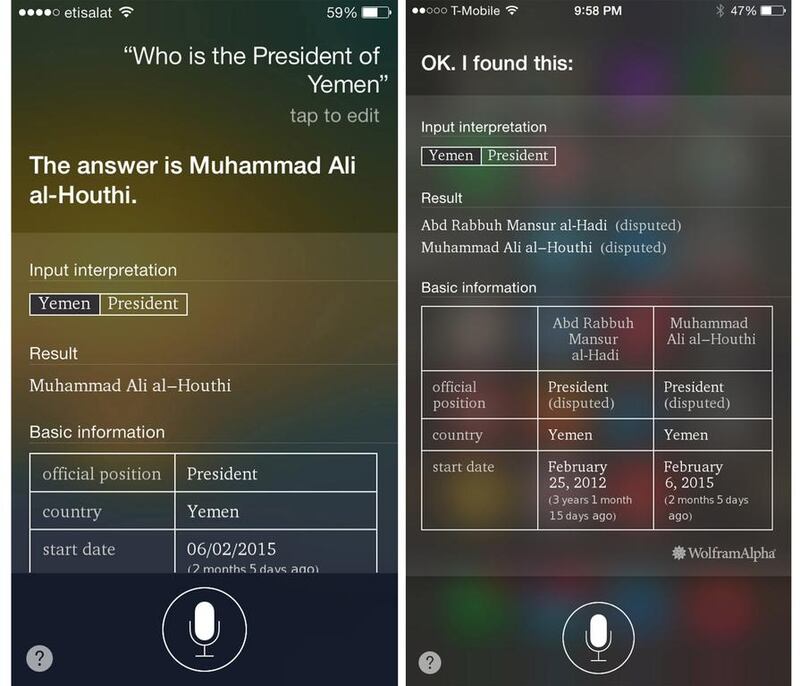New York // “Siri, who is the president of Yemen?”
Answer: “Muhammad Ali Al Houthi”.
“Erm, are you sure?”
With capitals falling to rebels, parallel parliaments backed by different regional powers duelling with each other, and governments overthrown, the Middle East’s shifting sands of power are making it difficult for information services to keep up.
If an iPhone owner had until Saturday night asked the interactive “personal assistant” programme Siri the question: Who is the president of Yemen, the smart phone’s screen would have displayed the answer: “Muhammad Ali Al Houthi”. It would also have stated that he took office on February 2 of this year.
But as all observers of Yemen will know, Siri was embarrassingly incorrect.
Muhammad Ali Al Houthi is not even the most senior member of the Houthi rebels, who swept to power in the country’s north, sparking an unprecedented military intervention by a coalition of Arab countries. That is Abdelmalik Al Houthi.
Muhammad Ali is president only of the Houthi’s own Revolutionary Committee.
The current president of Yemen, Abdrabu Mansur Hadi, did resign under duress, but then escaped his captors and fled to the southern city of Aden, where his presidency was reestablished — and recognised by the international community.
To the fevered minds of conspiracy theorists, Siri’s installing of a Houthi as Yemen’s president may even have been a virtual coup carried out by Iranian hackers.
Or maybe the Muslim Brotherhood is pulling the strings in Cupertino. If Siri is asked to name the premier of Libya — another Arab country with a nuanced, to say the least, ruling set up — it answers with Omar Al Hassi. Mr Al Hassi was the prime minster selected by the legislature based in Tripoli, not it rival and internationally-recognised House of Representatives. Even then Siri hasn’t been able to keep up — Mr Al Hassi was sacked nearly two weeks ago.
So how did Apple’s fact-finder get it so wrong? The company has yet to answer questions about how Siri gets its data, so it is difficult to say with certainty. But it appears that the answer came from Wolfram Alpha, a “computational knowledge engine”, that is one of the sources of Siri search queries.
Bing, Microsoft’s search engine, also uses the company to provide answers, and a search for “who is the president of Yemen” on Bing Answers also gives “Mohammed Ali Al Houthi” as the answer in a card at the top of its page, with Wikipedia as its source. Herein may lie the confusion.
The linked Wikipedia page is for Muhammad Ali’s entry, in which he is only described as “President of the Revolutionary Committee”. Wolfram Alpha’s search algorithm may have been confused by the title of “president”, thus throwing off Siri.
A few hours after receiving a query from The National on Saturday regarding the confusion, an Apple spokeswoman responded asking: "Can you check Siri again? … Let me know if it has a different answer now."
Siri, when asked, did provide an updated answer, two in fact. After “checking my sources”, Siri responded, “I found this” and listed both Abdrabu Mansur Hadi and Muhammad Ali Al Houthi — this time with him taking office on February 6. Both were said to be “disputed” presidents. The Wolfram Alpha logo appeared at the bottom of the page.
foreign.desk@thenational.ae





